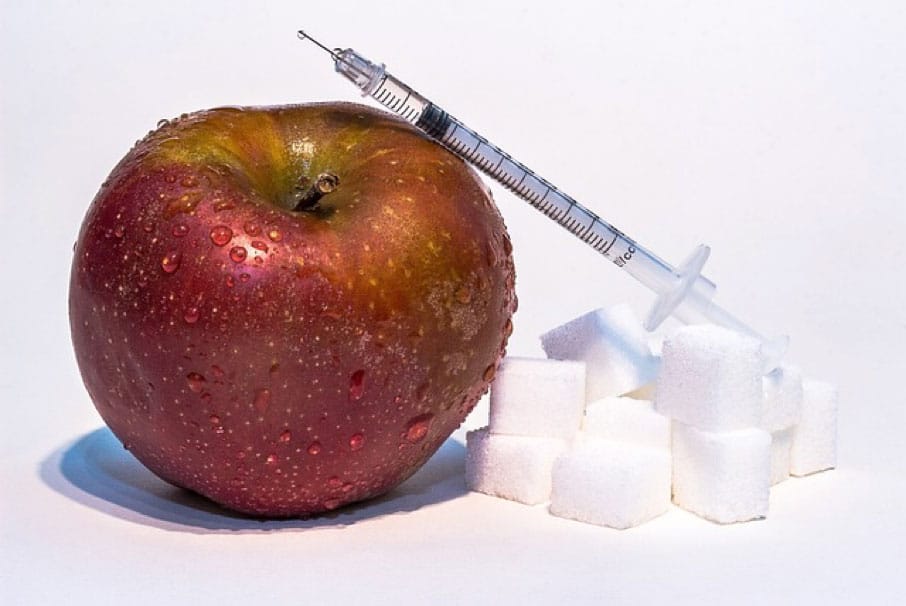Ketogenic diet for diabetes:
Cure or danger?

Studies have shown: Diabetics who follow a ketogenic diet over a longer period of time can lower their long-term blood glucose level (HbA1c) and reduce their diabetes medication.
Can our food actually be our medicine again?
What benefits can a ketogenic diet or low-carb diet, which is now on everyone’s lips and is sometimes touted as a miracle diet, have for diabetes?
Avoiding carbohydrates or fats as much as possible are the two best-known diet classics. And when it comes to the question of which of the two variants is better or more efficient, opinions differ. While the low-carb faction (low-carbohydrate diet) advertises avoiding blood sugar and insulin spikes, the low-fat proponents (low-fat diet) want to reduce the intake of saturated fatty acids to avoid inflammatory processes and elevated cholesterol. The latter theory is interesting at least in that the quality and proper composition of the fatty acids consumed is an important issue related to a healthy diet.
And if you have diabetes or pre-diabetes, then another explosive issue comes into play at this point: you have insulin resistance and thus a kind of “carbohydrate intolerance”. And the conclusion suggests itself that in this case nevertheless a renouncement on coal hydrates could be advantageous.
In the following text, we will now discuss how a ketogenic diet (carbohydrate content max. 20-50g/day) affects diabetes and how it interacts with other aspects of health.
Ketogenic diet: what is it?
What does ketogenic or ketosis mean?
In the ketogenic diet we deny the body access to carbohydrates, which are normally our main energy suppliers (in the form of glucose). As a result, after a few days (when the carbohydrate stores are empty), the body switches from carbohydrate metabolism (glycolysis) to fat metabolism (lipolysis). And the liver begins to form ketones from fats. Ketones are then released into the blood and into the mitochondria (=the power plants within our cells). Here they now serve as a replacement energy source for the missing sugar (glucose). In this case, we then speak of the metabolic state of ketosis. Ketone bodies can therefore also serve our body as an energy source. In particular, the brain can also use ketone bodies for energy production. By the way, it is quite similar when we fast. Thus, the ketogenic diet can also be called a fasting-imitating diet.

Eating only very few carbohydrates means consciously avoiding such foods with a high carbohydrate content. Tomatoes, asparagus and eggs are allowed as part of a ketogenic diet for diabetes.
Biochemical effects of ketosis:
- Mitochondria are the cell organelles in which energy production takes place. If the energy here is not obtained from glucose, but instead from fat, then fewer free radicals are produced as part of this combustion process. This also reduces oxidative stress and inflammation in the body as a whole.
- The metabolic switch to the fasting state causes a special enzyme (AMPK) to be activated. As a consequence, this causes a stimulation of autophagy (cell cleansing), cell protection and an increase in mitochondrial and energy production.
- The performance of the immune cells improves (so-called T-cell immunity)
- The cellular dependence on glucose is reduced
- The ketone body butyrate has an anti-inflammatory effect
- The fat burning is increased
The nutrient distribution in a ketogenic diet:
- 10% carbohydrates
- 20% protein
- 70% fat
TIP: If you want to find out whether you are in a state of ketosis, this is easily done with urine test strips for ketone bodies (available at the pharmacy).
What is the difference between ketogenic diet, low carb and Mediterranean diet?
The low carb diet describes first of all a diet in which less carbohydrates are supplied than the average consumer does (average carbohydrate consumption in Germany is 45-50%). It is thus an umbrella term and most diverse parliamentary allowance fall under it.
So one could count for example also the Mediterranean diet to it, because the average portion of the coal hydrates makes here typically less than 40%. Among other things, whole grain products are preferred, but at the same time very few sweets are consumed. As oil and fat source the native olive oil serves predominantly. The Mediterranean diet has been shown to reduce the risk of stroke and heart attack, among other things.
As already described above, the ketogenic diet, on the other hand, is about keeping the amount of carbohydrates in the diet as low as possible and at least below 50g/d (corresponding to a proportion of about 10%). It is an extreme variant of the low carb diet. The goal here is to completely “switch” the metabolism to fat burning. For the ketogenic diet, good successes have already been achieved and proven with regard to:
- Successful and sustainable weight loss
- Stable blood sugar regulation and reduction of insulin requirements in diabetics
- Successful therapy of epilepsy
- Improved endurance performance in athletes
- Presumed positive effects on various neurodegenerative diseases
- Probable relief of symptoms in PCOS (polycystic ovary syndrome)
- First pilot studies show improved cognitive function in Alzheimer’s patients
In addition, the ketogenic diet is a diet that has been repeatedly described for cancer patients in the literature for over 100 years. This is because cancer cells absolutely need sugar to grow. Cancer cells, on the other hand, can’t do much with fats and ketones.
“The median intake of total carbohydrates is 270 g/day for men and 220 g/day for women. This represents 45% of energy intake for men and 49% for women.”(National Nutrition Survey II)
Can a ketogenic diet positively influence diabetes?
Many scientific studies have shown outstanding results when type II diabetics followed a ketogenic or very-low-carb diet for a certain period of time: The change in diet resulted in weight loss and reduced blood fat and blood glucose levels. Many participants were subsequently able to successfully discontinue their diabetes medications and/or insulin.
There is also evidence that people with existing insulin resistance (and/or overweight) respond better to a low-carb diet compared to people without insulin resistance.
How can these positive effects be explained?
In diabetics, the sensitivity of the cell to glucose, or more precisely to insulin, is disturbed. This is because glucose needs insulin to enter the cell and serve as an energy supplier. And so diabetics need more and more insulin over time. But if the cell no longer needs glucose at all because it uses ketones for energy instead, then the insulin requirement also drops again. And since insulin also stops the breakdown of fat reserves in the body, the logical conclusion of a ketogenic diet with reduced insulin secretion is weight loss.
Advantages of a ketogenic diet for diabetics:
- Fat from the body cells is broken down and used for energy production -> weight reduction.
- Due to the very low intake of carbohydrates, blood sugar remains stable and less insulin is needed
- Less cravings and high feeling of satiety due to high fat and protein content
Are there also disadvantages or dangers of a ketogenic diet for diabetes?
In the initial phase of the dietary change, the so-called keto flu can occur with symptoms such as fatigue and weakness, headaches, cravings or digestive problems. This is due to the metabolic change, which can last a few days. Afterwards, the symptoms usually disappear again.
Of course, diabetics should keep a close eye on their blood glucose levels because, as described above, such a radical change in diet leads to changes in lower blood glucose and insulin levels, which can also lead to blood glucose slips.
If a very high proportion of animal products is consumed as part of the ketogenic diet (not recommended!), then the increased intake of proteins and saturated fatty acids can lead to hyperacidity of the organism and the formation of kidney stones. In addition, there is a risk that the cholesterol level and also inflammatory parameters will increase in the long term. The fat requirement should therefore be covered almost exclusively from healthy fat sources such as fish, nuts, olives and avocado – this can prevent this problem.
Any diet with omission of certain food groups always also carries the risk of one-sidedness and imbalance, especially if there is no professional accompaniment. In the ketogenic diet, for example, the lack of consumption of whole grain products and legumes can lead to a mineral deficiency. In particular, this diet often also provides too little fiber, which in turn negatively affects the intestinal flora and intestinal health.
However, all these possible negative effects can be avoided if the body’s own “weak points” are taken into consideration from the outset and the above-mentioned points are taken into account in the choice of food.

No matter what the diet, a one-sided diet always carries the risk of developing micro- or macronutrient deficiencies. A conscious selection of foods and a varied menu is therefore always recommended. Sometimes a targeted laboratory analysis can be very helpful in detecting any deficiencies.
Conclusion
There are arguments in favor of a ketogenic diet, as well as those against it. Regarding the long-term health effects, science is still divided. It is possible that the decisive factor here is not the ketogenic diet itself, but rather the composition of the foods in the diet. In the case of diabetes in particular, it is important to draw up an individual therapy regimen and to monitor selected laboratory values closely, at least in the initial phase. And last but not least, personal dietary preferences and habits should always be taken into account in the nutrition therapy. After all, food intake should not only provide energy, but also give pleasure, represent enjoyment and promote sociable and social interaction.
A less radical change in diet may be more beneficial in the presence of diabetes and should always be considered (e.g., the Mediterranean diet described above or intermittent fasting).
Neither carbohydrates nor fats are good or bad per se. Vegetables and whole grain products as well as white flour and sweets contain plenty of carbohydrates. What matters most is WHICH we choose.
How we can help you in the THERA Praxis…
In the THERA Praxis, we are happy to support you in changing and optimizing your diet.
It is often easier and more successful to walk the path together and to receive regular feedback.
Control examinations of the blood and intestinal values as well as a control of the body composition by means of BIA measurement can give a lot of security and show the success of the therapy.
Our very wide range of therapies outside of nutritional medicine can also be an optimal supplement.
A consultation with a doctor before starting the ketogenic diet as well as a regular medical check-up during a long-term dietary change is recommended in any case.
Your contact persons
Contact and appointment possible at any time
Do one or more of the above points apply to you and would you like to do something for your health? Are you curious? Please feel free to contact us by phone to make an appointment.
You can reach us according to our opening hours at tel. 030 79016533. We look forward to your call or message.
References:
Dashti, Hussein M.; Al-Zaid, Naji S.; Mathew, Thazhumpal C.; Al-Mousawi, Mahdi; Talib, Hussain; Asfar, Sami K.; Behbahani, Abdulla I. (2006): Long term effects of ketogenic diet in obese subjects with high cholesterol level. Molecular and cellular biochemistry 286 (1-2), S. 1–9. DOI: 10.1007/s11010-005-9001-x
Boden, Guenther; Sargrad, Karin; Homko, Carol; Mozzoli, Maria; Stein, T. Peter (2005): Effect of a low-carbohydrate diet on appetite, blood glucose levels, and insulin resistance in obese patients with type 2 diabetes. Annals of internal medicine 142 (6), S. 403–411
Mobbs, Charles V.; Mastaitis, Jason; Isoda, Fumiko; Poplawski, Michal (2013): Treatment of diabetes and diabetic complications with a ketogenic diet. Journal of child neurology 28 (8), S. 1009–1014. DOI: 10.1177/0883073813487596.
Paoli, A.; Rubini, A.; Volek, J. S.; Grimaldi, K. A. (2013): Beyond weight loss: a review of the therapeutic uses of very-low-carbohydrate (ketogenic) diets. European journal of clinical nutrition 67 (8), S. 789–796. DOI: 10.1038/ejcn.2013.116.
Hussein M Dashti , Naji S Al-Zaid, Thazhumpal C Mathew, Mahdi Al-Mousawi, Hussain Talib, Sami K Asfar, Abdulla I Behbahani (2006): Long term effects of ketogenic diet in obese subjects with high cholesterol level. Mol Cell Biochem. 286(1-2):1-9. Doi: 10.1007/s11010-005-9001-x
Volek, Jeff S.; Phinney, Stephen D.; Forsythe, Cassandra E.; Quann, Erin E.; Wood, Richard J.; Puglisi, Michael J. et al. (2009): Carbohydrate restriction has a more favorable impact on the metabolic syndrome than a low fat diet. Lipids 44 (4), S. 297–309. DOI: 10.1007/s11745-008-3274-2
Paoli, A.; Rubini, A.; Volek, J. S.; Grimaldi, K. A. (2013): Beyond weight loss: a review of the therapeutic uses of very-low-carbohydrate (ketogenic) diets. European journal of clinical nutrition 67 (8), S. 789–796. DOI: 10.1038/ejcn.2013.116
Canto C, Jiang LQ, Deshmukh AS, Mataki C, Coste A, Lagouge M, Zierath JR, Auwerx J: Interdependence of AMPK and SIRT1 for metabolic adaptation to fasting and exercise in skeletal muscle, Cell Metab. 2010 Mar 3;11(3): 213-9
Hussain M Dashti , Thazhumpal C Mathew , Naji S Al-Zaid (2021): Efficacy of low-carbohydrate ketogenic diet in the treatment of type 2 diabetes. Med Princ Pract 2021; 30(3):223-235











